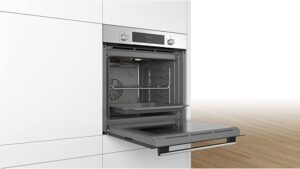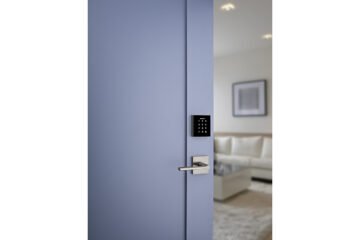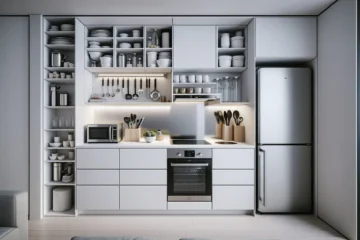In today’s world, where sustainability is becoming increasingly important, optimizing water usage in our homes is a key consideration. The kitchen, being one of the most water-intensive areas in any household, presents a significant opportunity for improvement. Enter smart water management systems, which include smart appliances designed to help us use water more efficiently. In this blog post, we will explore the benefits of these innovative technologies, discuss installation tips, and highlight some of the latest smart home appliances market trends .
Understanding Smart Water Management
Smart water management refers to the use of advanced technologies to monitor and control water usage in real-time. This includes devices that can detect leaks, optimize flow rates, and provide insights into consumption patterns. By integrating smart appliances into your kitchen, you can significantly reduce water waste while enhancing convenience.

Benefits of Smart Appliances for Water Management
- Water Conservation: One of the primary advantages of smart appliances is their ability to conserve water. For instance, smart dishwashers are designed to use only the necessary amount of water for each load, minimizing waste compared to traditional models.
- Increased Efficiency: Smart appliances can be programmed to operate during off-peak hours or when water rates are lower. This not only saves money but also reduces strain on local water supplies during peak usage times.
- Leak Detection: Many smart appliances come equipped with sensors that alert you to leaks or unusual water usage patterns in real-time. Early detection can prevent costly repairs and further damage to your home.
- Remote Monitoring: Many smart water management systems allow you to monitor your water usage from your smartphone or tablet. This feature enables you to track consumption trends over time and adjust your habits accordingly.
- Integration with Smart Home Systems: Smart appliances can be integrated into your existing smart home ecosystem, allowing for seamless control alongside other devices like thermostats and lights.
Installation Tips for Smart Appliances
Installing smart appliances can be a straightforward process if you follow these steps:
1. Choose the Right Products
Before installation, research the various smart appliance models available on the market. Look for features that meet your needs, such as energy efficiency ratings, connectivity options, and user reviews. A great option is the Bosch Serie 6 Free-Standing Dishwasher, which offers excellent water efficiency and advanced features.
2. Gather Necessary Tools
Before starting the installation process, gather all necessary tools such as an adjustable wrench, screwdrivers, plumber’s tape, and a bucket to catch any excess water during installation.
3. Turn Off Water Supply
Before removing your existing appliance or installing a new one, ensure that the water supply is turned off at the shut-off valves under the sink. Open the appliance to release any remaining pressure and drain excess water.
4. Remove Old Appliance
Disconnect the old appliance by loosening any mounting nuts or screws and carefully removing any hoses attached to it.
5. Install New Appliance
Follow the manufacturer’s instructions for installing your new appliance. Typically, this involves placing the appliance in its designated space and securing it according to guidelines.
6. Connect Water Supply Lines
Attach the water supply lines to your new appliance using plumber’s tape for a secure seal. Ensure all connections are tight but avoid overtightening.
7. Test for Leaks
Once everything is connected, turn on the water supply slowly while checking for leaks around all connections. If any leaks are detected, tighten the connections as necessary.
8. Set Up Smart Features
Follow the manufacturer’s instructions to set up any smart features associated with your appliance. This may involve downloading an app on your smartphone or connecting it to your home Wi-Fi network.
Smart Home Appliances Market Trends
The smart home appliances market is rapidly evolving, with innovative products continually being introduced to enhance convenience and sustainability in our homes. Here are some notable trends:
- Increased Demand for Sustainability: Consumers are increasingly seeking products that promote sustainability and energy efficiency. Smart appliances that conserve both energy and water are becoming more popular as homeowners look for ways to reduce their environmental impact.
- Integration with Voice Assistants: Many smart appliances now offer compatibility with voice assistants like Amazon Alexa and Google Assistant. This integration allows users to control their appliances hands-free by issuing voice commands.
- Data-Driven Insights: Advanced smart appliances are equipped with sensors that provide users with data about their water consumption habits. This information can help homeowners identify areas where they can improve efficiency.
- Focus on Health and Safety: As health concerns continue to rise, many consumers are looking for products that promote cleanliness and hygiene in their kitchens. Smart dishwashers often include sanitizing cycles that ensure dishes are thoroughly cleaned.
- Smart Home Ecosystem Compatibility: More manufacturers are ensuring that their products seamlessly integrate with existing smart home ecosystems, allowing users to control multiple devices from a single app or interface.
Recommended Products For Optimal Water Management
- Moen Arbor Touchless Kitchen Faucet
Features: Motion sensor technology for hands-free operation.
Price: Approximately £400.
Purchase Moen Arbor Touchless Kitchen Faucet

- Bosch Serie 6 Free-Standing Dishwasher
Features: Efficiently cleans dishes while conserving water.
Price: Approximately £800.
Purchase Bosch Serie 6 Dishwasher

- AquaTru Countertop Water Filtration System
Features: Removes contaminants from tap water while providing clean drinking water.
Price: Approximately £400.
Purchase AquaTru Countertop Water Filtration System

Conclusion
Smart water management in the kitchen is an essential step towards optimizing resource usage while enhancing convenience and sustainability in our homes. By installing smart appliances like dishwashers alongside faucets designed for efficient operation, homeowners can significantly reduce water waste while enjoying modern conveniences like remote monitoring and automated operation.
As smart home appliances market trends continue to evolve towards sustainability and integration with advanced technologies, investing in smart kitchen solutions becomes increasingly appealing. By adopting these innovations today, we can contribute positively to our environment while enjoying a more efficient lifestyle.
For those looking to upgrade their kitchen with smart technology, consider exploring products like the Bosch Serie 6 Free-Standing Dishwasher available on Amazon—your first step towards smarter living!


